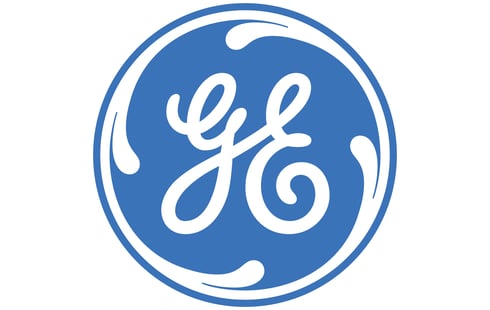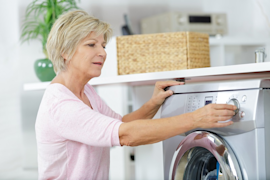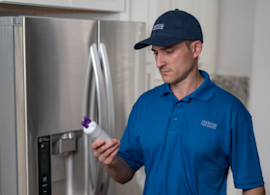GE CleanSpeak top-load washer error codes

These error code explanations can help you diagnose a problem with your GE Clean Speak top-load washer. For repair how-to help, visit the PartsDirect repair help section, which includes repair help for washing machines, other major appliances, lawn and garden equipment, garage door openers, vacuum cleaners and more. Search for your model number to find a complete list of replacement parts for your washer.
User interface control board is defective
Unplug the washer for 5 minutes to reset the main electronic control board and the user interface control board. If the code returns when you restore power, replace the user interface control board.
Bulk detergent dispenser or bulk fabric softener dispenser not operating properly
Unplug the washer and clear the bulk dispenser hoses of clogs or kinks. Reconnect any loose wires between the bulk dispenser tank level sensors and the main electronic control board. Replace any damaged wires. Replace the bulk dispenser tank level sensors if defective.
Stuck button on the user interface control board
Unplug the washer for 5 minutes to reset the main electronic control board and the user interface control board. If the code returns when you restore power, replace the user interface control board.
Water level pressure sensor is defective
Unplug the washer and reconnect the wires between the water level pressure sensor and the main electronic control board. Replace the wire harness if damaged. Reconnect the air hose between the water level pressure sensor and the bottom of the washer tub. Replace the air hose if damaged. Replace the water level pressure sensor. If the problem persists, replace the main electronic control board.
Lid lock is defective
Unplug the washer and reconnect the wire harness connections between the lid lock assembly and the main electronic control board. Replace the wire harness if damaged. Replace the lid lock assembly if it's damaged or defective.
Not filling with water
Make sure that both water supply valves behind the washer are fully open. In winter, check the fill lines for freezing. Check the drain system for a siphon problem. If the water inlet valve assembly is defective, replace it.
Drain pump is defective
Remove any clogs from the washer drain and drain hose. Straighten the drain hose if kinked. Replace the drain pump if defective.
Main electronic control board is defective
Unplug the washer for 5 minutes to reset the main electronic control board. Restore electrical power. If the code returns, replace the main electronic control board.
Heater is defective
Unplug the washer and reconnect wires on the heating element. Replace the heating element if defective. If the problem persists after replacing the heating element, replace the main electronic control board.
Mode shifter is defective
Unplug the washer and reconnect wires on the mode shifter. Replace the wire harness if damaged. If the wiring connections are okay, replace the mode shifter. If the problem persists, replace the main electronic control board.
Flood level detected
If the washer is not overfilling, replace the water level pressure switch. If the washer is overfilling, unplug the washer and replace the inlet water valve assembly if the washer continues to fill while unplugged from the power supply.
Thermistor (water temperature sensor) is defective
Reconnect any loose wires on the thermistor. Replace the wire harness if it's damaged. Measure the thermistor resistance using a volt/ohm meter. If the resistance isn't 13,840 ohms at 70F, replace the thermistor.
Locked rotor on the drive motor
Rotate the spin basket to see if it spins freely. Remove any foreign objects trapped between the spin basket and the outer plastic tub. Unplug the washer and reconnect any loose wires on the drive motor and hall sensor (motor speed sensor). Replace the wire harness if damaged. If the wire harness is okay and the basket spins freely, replace the hall sensor. If the problem persists, replace the main electronic control board.
Hall sensor (motor speed sensor) is defective
Unplug the washer and reconnect any loose wires between the hall sensor and the main electronic control board. Replace the wire harness if damaged. If the wiring is okay, replace the hall sensor. If the problem persists, replace the main electronic control board.
Most common symptoms to help you fix your washers
Choose a symptom to see related washer repairs.
Main causes: clogged drain hose, house drain clogged, bad drain pump, water-level pressure switch failure, bad control b…
Main causes: worn agitator dogs, bad clutch, broken motor coupler, shifter assembly failure, broken door lock, suspensio…
Main causes: bad lid switch or door lock, bad timer or electronic control board, wiring failure, bad water inlet valve a…
Main causes: broken lid switch or lid lock, bad pressure switch, broken shifter assembly, faulty control system…
Main causes: unbalanced load, loose spanner nut, worn drive block, broken shock absorber or suspension spring, debris in…
Main causes: no water supply, bad water valves, water-level pressure switch failure, control system failure, bad door lo…
Main causes: lack of electrical power, wiring failure, bad power cord, electronic control board failure, bad user interf…
Main causes: leaky water inlet valve, faulty water-level pressure switch, bad electronic control board…
Main causes: water heater failure, bad water temperature switch, faulty control board, bad water valve, faulty water tem…
Most common repair guides to help fix your washers
Effective articles & videos to help repair your washers
Use the advice and tips in these articles and videos to get the most out of your washer.

Find tips for using your washing machine efficiently to save energy and help reduce utility bills.…

Learn about all the convenient features on our Sears PartsDirect website that make your parts purchases easier.…

Get answers to frequently asked questions about Sears and Sears PartsDirect.…